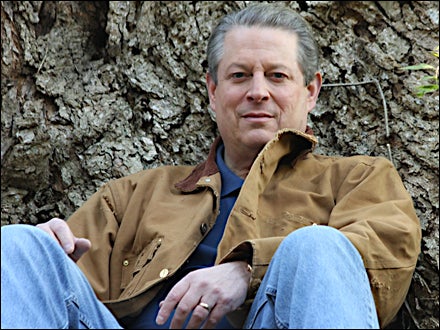(Rodale Press, $27) explores so many promising ideas, from efficiency gains to a U.S. super-grid that would transmit more energy farther and faster. Where do we start?
Efficiency improvements offer the fastest opportunities for progress. And the best way to unlock all of those solutions is to put a price on carbon. We ought to immediately take steps to protect forests, and we need to pay attention to some of the enabling infrastructure like the super-grid and encourage the more rapid development of advanced battery systems.
Are we doing any of that right now?
Definitely. We haven't made as much progress as I would have liked, but we have seen a big change since President Obama's inauguration. The stimulus bill kick-started construction of a U.S. super-grid. The one piece that is still in formation is the placement of a price on carbon. It's extremely unwise to continue using a system for valuation that completely ignores the destruction of the planet's ecological integrity.
You write that, when we do start to pay for carbon, a lot of companies suddenly won't look so profitable.
No question about it. There are millions of business plans that assume carbon-dioxide emissions have zero value, and those business plans are in danger of becoming obsolete rather quickly. So, yes, there is a subprime carbon-asset bubble that is going to have to be dealt with. Many businesses are already taking steps to reduce their exposure, but so long as business leaders are penalized for slightly missing quarterly earnings projections, they're going to be irrationally resistant to investments that are good for their shareholders in the long term.
You'd think that, with China staking its renewable-energy claim, we'd be stampeding to invest. What's the holdup?
Inertia. A second reason is this short-term investment horizon, and a third factor is the legacy political power of carbon polluters, who are just digging in their heels. A change as large as this doesn't happen quickly, but we are very close to a political tipping point.
How do you talk to those climate-change naysayers?
The denial movement is in its sunset phaseand they're putting on a spectacular display just before they fade. The scientific evidence is so overwhelming now. And people are seeing changes all around them: Older people are telling their grandchildren these patterns are different. Farmers are no longer able to predict the arrival of rainfall. People who look for birds are finding dramatic shifts in their range. They must not watch Glenn Beck.
So what's more important in our own lives: trying to be greener or pushing for political change?
They go together. All of us can make changes, but the changes that are most needed are not lightbulbs and windows but laws and policies and treaties. So, yes, we are in a phase of this struggle where civic and political action are at the top of the list.
What do you do about your own carbon footprint?
Tipper and I have put in solar panels, new windows, additional insulation; we drive hybrids; we purchased green electricity from renewable sourcesthe geothermal took our natural-gas bill down to zero. But it's all-pervasive. The bigger changes are going to come from laws.
But people still criticize you for flying around so much.
I fly commercial except in rare instances, and I offset my travel. But in getting the word out and getting the change under way, I think it's important to go to places like Copenhagen, where you can make a big difference. Having said that, I've also cut down on travel.
Now that the book's out, do you have any adventures planned? I know you've climbed Mount Rainier with your son.
That backpack gets a little heavier above 14,000 feet, but it was great fun. We tend to do our outings closer to home. I go up to wilderness areas and to Center Hill, a lake near Nashville. I got some friends to build me a houseboat with solar panels and biodiesel enginesit's a big toy, but it's fun and I don't travel halfway around the world to get there.


